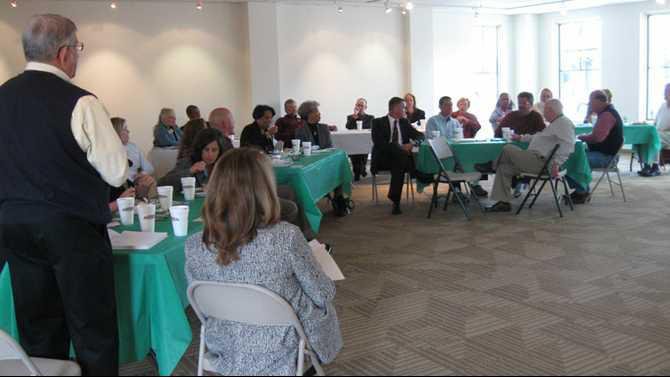The metro Atlanta United Way is changing the way it does business, and that may take some getting used to for Rockdale’s community leaders and non-profits, according to a discussion held Tuesday. ay Chief Operating Officer Donna Buchanan spoke to about 30 community leaders about the reorganization of United Way staffers underway. Instead of county-based offices, programs, and funding, staffers will now be taking a regional, multi-county approach to working on topic areas, such as health, education, homelessness, and income. This approach, which would be similar to the work of the Atlanta Regional Commission on Homelessness, was approved by the United Way board last year. "Instead of making decisions in segmented silos, we decided we needed to make more holistic, collaborative decisions," Buchanan said. "What we’re doing is not centralizing or decentralizing; we’re functionalizing, if that makes sense," said Buchanan. "We’re trying to help everybody do what they do best." Rockdale would be part of a six-county swath nicknamed the Southern Crescent that includes Henry, Butts, Clayton, Fayette, and Coweta counties. A northeast mini-region would be made up of Fulton, DeKalb and Gwinnett while Cobb, Cherokee, Paulding and Douglas make up the northwest mini-region. Each county would still have an advisory board, but there would also be a representative from each county on the committees for each of the main topic areas. Out of the two part-time and one full-time United Way staffers currently in the Rockdale office, Rockdale director Clair Cline will now work with volunteer leadership, Julie Mills will work on projects to end chronic homelessness, and Kysa Daniels will work on projects toward education. In the past, Rockdale was the beneficiary of having staffers and an office within close proximity. For the last several years, Rockdale County has received about $200,000 more than it raised annually because of the number of active programs it had.’ The Rockdale United Way office funds eight non-profits and had three original initiatives it works on. Buchanan also praised the collaborative nature of the community in Rockdale, which she acknowledged was in large part due to Cline’s work. "You really have been state of the art," she said. Funding for non-profits, called grantee partners, will also be opened up to any group that has received United Way funds in the past and can show measurable results that address the main goal areas or content areas. Criteria for those goals/areas will be posted on www.unitedwayatlanta.org by March 16 and the application process will be finished by July. Each county will also have a basic fund that they will dole out for urgent and human care needs, said Buchanan, and a small pool of funds will be available to award innovation in non-profits. Attendees questioned the effect it would have on the projects and collaborative work already underway in Rockdale. Jeff Beech, who heads the Light House Village, a campus of three nonprofit entities, said he was concerned about diluting the institutional knowledge in the Rockdale United Way staffers. "Financial capital is important, but I’ll give you back some of your financial capital if you do not dilute some of our human capital," he said. "I believe our human capital will far surpass being able to go out and get additional human capital."
United Way reorganizes




